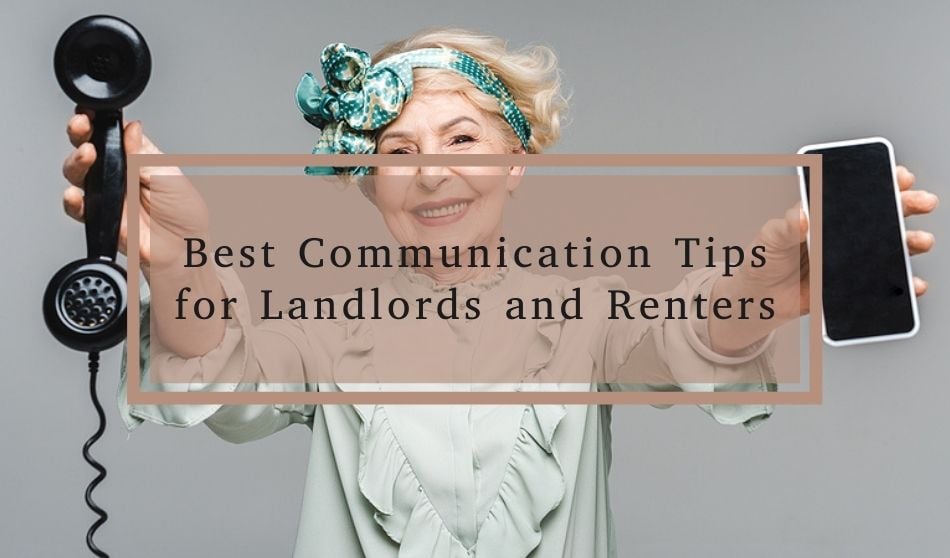
My smartphone can do that?
Every day new apps and updates present themselves, making our cell phones an invaluable communication tool. But, even with all the bells n’ whistles money can buy you might still lose the communication game without first perfecting soft-skills such as great phone etiquette and follow-through.
With the current climate and stressors, let’s explore communication tips for both renters and landlords to bridge the gap and create positive synergy.
Landlord’s Communication Corner
Whether you are a private landlord, leasing agent, or community manager, every interaction is an opportunity to set the tone, increase trust and loyalty, and build your reputation.
You likely are on the phone all the time with calling on tenant references, making appointments, vetting contractors, calling vendors for repairs, and checking in on tenants. Try out these techniques next time you’re on a call.
Body Language
Give yourself a few rings (2-4) to get yourself ready for the call. Take a deep breath and sit up. Your posture can help you set the tone and put you in a professional state of mind. Then, smile! It’s amazing how a smile can come across on the phone. Pretend you’re on a video call if it feels unnatural.
Active Listening
When deployed, active listening can deescalate an angry caller, keep the conversation flowing productively, and keep you organized. It involves taking notes, rephrasing what the caller is saying, and showing empathy. Active listening also keeps you aware of the cues the caller is giving so you aren’t blindsided by an escalation.
Tact and Honesty
Of course, you never intentionally lie or mislead a tenant but without a balance of tact and honesty, you may come across evasive or lacking confidence. It goes a long way toward building trust if you are upfront when you don’t know an answer or have bad news or a difficult topic to discuss.
Attitude
Confidence is key here. Know your facts, rules, regulations, and purpose beforehand will help prepare you for any communication. But even if you don’t know, you can confidently say, “that’s a great question and I want to make sure to find the correct answer for you”.
Confidence alone can come off as haughty or conceited if not balanced with helpfulness. To portray helpfulness use words such as: certainly, delighted, of course, absolutely, glad to help, wonderful, etc.
Clarity
Enunciate and slow down enough to choose your words carefully.
Voice
Sometimes we think we are stuck with the voice we’ve been given, but there is much we can do to modify it for clarity and communication.
- Volume: Lower your volume when someone is upset or serious. Only raise it a bit to match enthusiasm but never in an intense discussion nor to overshadow.
- Pitch: We can speak in low tones or high pitch. It’s best though to vary the pitch to not come across monotone and bored. Again, in a heated discussion, lower your pitch just a tad.
- Tone and Speed: If you speak too fast it can sound pushy and aggressive or come across that you’re anxious and nervous. Matching speed and tone can help build rapport. Take it down a notch in tone and speed can help calm an upset caller.
What we say and how we say it portrays an overall message. It should be one that is inviting, friendly. Intelligent, professional, and happy to take the call. It’s what makes a first impression and resonates with positivity.

Remember to take a breath and smile to portray friendliness on a call.
Anatomy of a Call and Best Phone Etiquette Practices
Be quick to answer in 3-4 rings. This should ring true for your voicemail pick up as waiting creates frustration.
Thank them for calling, announce yourself, and find out who and why they are calling.
Ask before putting someone on a very brief hold and wait for a response. Hold time under a minute is best.
If you have to hand a call off to another person use the term ‘connect’ rather than ‘transfer’. Using the term ‘transfer’ feels like being passed off. Connecting is much friendlier. Then, when you connect them to the other party, introduce the caller to the party and the reason for the connection. Stay on the line just a bit to make sure they are being helped.
Set expectations throughout the call to express what you can and can’t accomplish and set proper expectations. If it’s a complex issue that needs further attention, be sure to under commit and over-deliver. Clarify the next steps by repeating what you’ll do after you hang up.
Ask instead of command or demand. Replace ‘I need’ with ‘May I’ or ‘Please let me’. Feel the difference between ‘May I ask for your number’ vs ‘I need your number’. No one likes to hear, “Hold please” when “May I place you on a brief hold” gives your callers a sense that you care and that they have options.
When you end a call, thank them for calling and wish them a pleasant rest of the day (in a manner that fits your personality and the tone of the call). It’s important to let the caller hang up first. It’s not only polite but can never be misinterpreted.
Landlord and Leasing Agents – Avoid These Communication Mistakes
Calling too late.
Make all phone calls during reasonable hours. What are reasonable hours? Typically business hours. Which means avoid calling on holidays and weekends as well. The two good legal reasons to limit calls to business hours:
- Avoid the appearance of harassment. Tenants have the right to quiet enjoyment of their rental home, including freedom from harassment.
- Unless prospective tenants have given you proper authorization, contacting them outside of normal business hours may cross telemarketing regulations depending on your state guidelines.
Leaving long messages.
How many times have you deleted a message or called someone back without listening to their message first? Short and sweet is the rule. Keep your voicemail messages under 30 seconds if possible.
Texting bad news.
Send them a quick text that you’d like to speak with them when they are available but leave the details for a phone call. Of course, texting an announcement, information, invoice updates, and the like are perfectly fine.
Interrupting, just don’t do it!
No one likes to be interrupted. You may be in the habit of jumping in because you’ve had a hundred of these same types of calls and know where the conversation is going but don’t give in to the temptation. The person on the other end needs to be heard in full just as you do.

No need to get loud unless it’s out of exuberance. Tone and volume are important communication tools.
Renter’s Communication Corner
It takes two to make a productive conversation. The landlord is just half of the equation. Renters can help direct a call, set the tone, and build a good landlord-tenant relationship. What can a tenant do on a call? Many of the same skills as above such as:
Make a good impression by actively listening, take notes, speak clearly with purpose, be polite, and ask good questions without being demanding or insulting. Remember that unlike shopping or leisure, you are in a relationship with your landlord. Every good relationship needs mutual understanding and kindness.
Tenants: Avoid These Communication Mistakes
Distractions
Try to put away distractions when on a call with your landlord (or anyone for that matter). It shows respect and will help avoid misunderstandings.
Heated Emotions
The pipes in the bathroom are leaking and you’re clearly upset. But, your landlord is not an adversary and likely has your best interests at heart. Landlords want to provide housing, it’s what feeds their family and it’s their chosen profession. Heated emotions, blaming, and rudeness, when something is amiss or goes askew, does not help resolve the situation. Remember, landlords are more than likely happy to help.
Long Messages
Announce who you are, how they can reach you, and why you’d like a call back is perfect as-is. Your landlord can get the finer details when you speak on the phone. For repairs, you may want to use your tenant portal to submit a maintenance request instead of a call.

With remote work, communication distractions can occur for both landlords and tenants. Try to keep these at a minimum. If you can’t separate from the distraction, be sure to let the other party know what you are dealing with and coordinate a better time or type of communication the suits the concern.
Communication Rules for Everyone
Follow the Golden Rule and do to others as you’d have them do to you. Simple but effective.
Texts shouldn’t be too informal, especially in professional communication. Spell out words and use full sentences and keep emoji use to a minimum.
Don’t make assumptions. You might be quick to think your landlord doesn’t care or your tenant is avoiding you. Assumptions create misunderstanding and conflict. If anything, assume the best, not the worst.
Be willing to compromise. Landlord-tenant relationships shouldn’t be a winner-takes-all situation. Everyone can benefit from a win/win solution and compromise is key. There are times when one party can’t compromise but having the mindset to try can make all the difference.
Avoid distractions. Side comments and conversations, driving, kids, surrounding noises can be a hindrance to good communication.
Politeness is kindness and every opportunity to communicate should be enveloped with politeness. It’s common courtesy. For example, on the phone instead of saying, ‘What? I didn’t hear you” try “I apologize, I’m having trouble hearing you, do you mind repeating what you said”.
Rental Industry Technology Push
Times have changed and so has the rental industry — from how landlords and tenants communicate to how rent is received. Now more than ever, the relationship between property managers and renters is technology-driven and there’s no going back as more and more are looking for virtual solutions to face-to-face activities. It’s now mainstream to:
- Process online rent payments through tenant portals by ACH (electronic payments to/from a bank) and credit cards.
- Accept electronic cash payments at convenience stores through programs such as PayNearMe.
- Allow for virtual and self-guided tours of vacancies.
- Accept online rental applications.
- Conduct virtual and self-guided rental inspections.
- Offer online portals to view invoices and ledgers, file storage (such as leases), and make maintenance requests.
…. And the list goes on depending on the nuances for property managers, leasing agents, prospective tenants, investors, and other property owners.
Just about any activity or communication between a landlord and tenant can have a virtual component these days.
But virtual doesn’t mean without interaction or communication. Calls, texts, emails, documents, and the like continue and are even more important than ever to handle professionally and efficiently.
Since cell phones are the lifeblood of a landlord and never far from a renter, knowing best practices to build quick rapport and a lasting relationship is to review communication soft-skills.
Proptech alone doesn’t fill vacancies for landlords or secure the perfect apartment for a prospect. It takes applying some old school etiquette to new technologies to strike a balance between goal setting and accomplishment.





